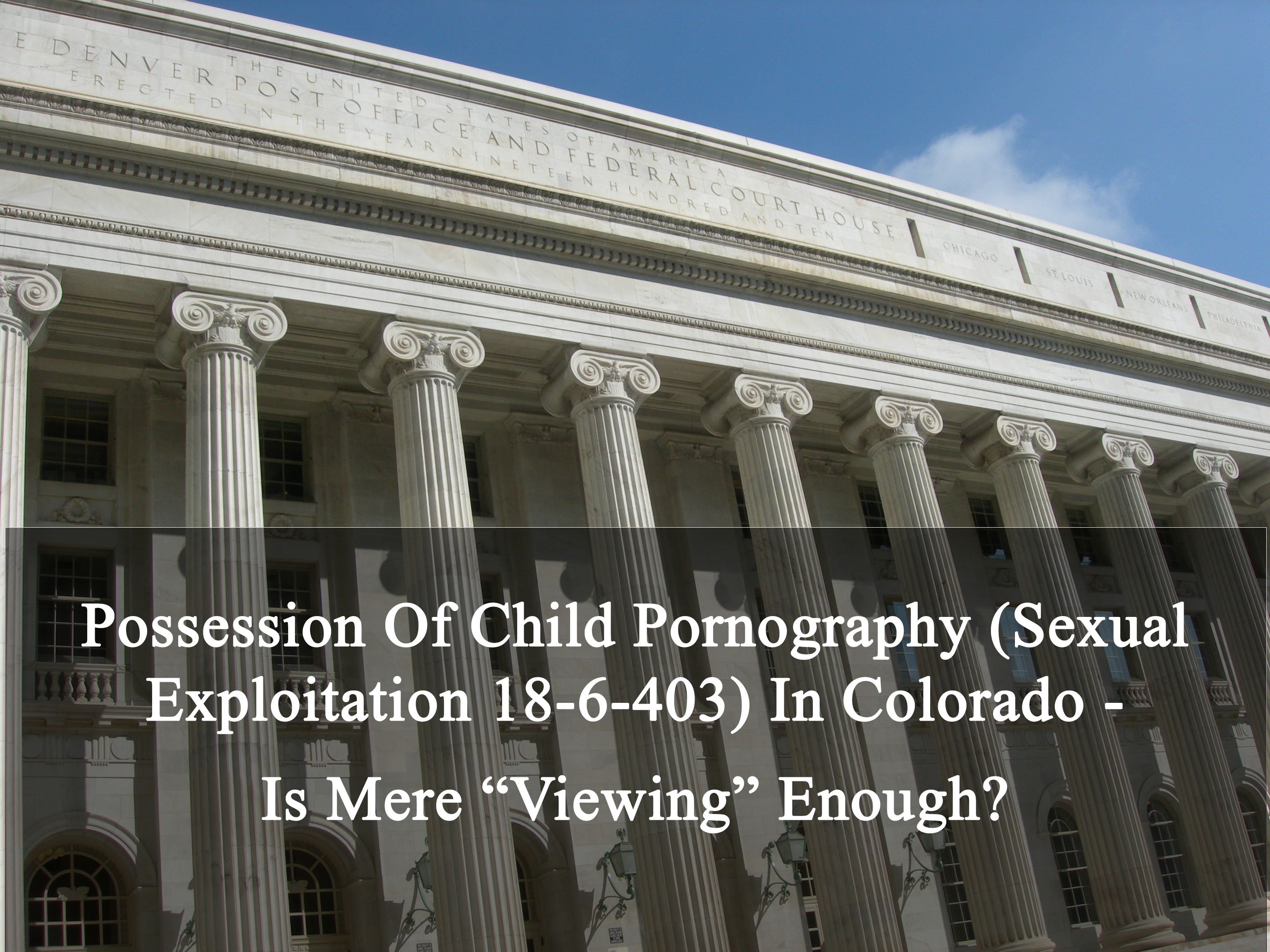




Feb 11
Possession Of Child Pornography (Sexual Exploitation 18-6-403) In Colorado – Is Mere Viewing Enough?

Possession Of Child Pornography (Sexual Exploitation 18-6-403) In Colorado – Is Mere Viewing Enough?
By H. Michael Steinberg Colorado Sex Crimes Criminal Defense Lawyer – Attorney
Possession Of Child Pornography (Sexual Exploitation 18-6-403) In Colorado – Is Mere Viewing Enough? In Marsh v. People – a 2017 decision, the Colorado Supreme Court held that “possession” under Colorado’s child pornography statute now includes merely viewing child pornography on the Internet and does NOT require downloading or otherwise saving the images.
In People v. Marsh the State of Colorado presented evidence at trial that established that Defendant’s computer “cache” contained images that were child pornography.
An internet cache is a temporary file that contains images that are automatically stored on the computer’s hard drive after a computer user views them on a website. A cache allows a computer to quickly recalls images from the cache rather than having to download them again from the internet again.
The issue in ALL cases where a person is charged with Sexual Exploitation of A Child 18-6-403 is this: – can the prosecution establish the “possession” of images of child pornography AND, if so, how many images were possessed and how were they possessed?
The number of images of child pornography that are admitted against a Defendant is important.
Under Colorado law, the more images of child pornography located on an individual’s computer and viewed by the Defendant the more enhanced the possible penalty.
The mere possession of even 1 image of sexually exploitative material is a class 5 felony.
§ 18-6-403(5)(b), C.R.S. BUT the possession of more than twenty items increases the level of felony to a class 4 felony.
The importance of the March case is that under certain conditions the presence of temporary internet cache files stored on a person’s hard drive can constitute evidence of “knowing possession” as used in Colorado’s child pornography statute – 18-6-403, C.R.S.
The Marsh Court found many things – most important among them was that when a Defendant seeks out and views child pornography on the internet, he possesses the images he views.
“Possession” of Child Pornography – Sexual Exploitation Of A Child – Occurs When Computer User Views Files on Internet – Section 18-6-403, C.R.S.
Sexual Exploitation Of A Child – 18-6-403(3)(b.5) provides that:
“[a] person commits sexual exploitation of a child if . . rtwsref. he or she knowingly . . . [p]ossesses or controls any sexually exploitative material for any purpose.”
Is Merely Finding Child Pornography In An Internet “Cache” Enough To Establish Possession?
The Marsh case must not be read incorrectly. Child pornography images that have been automatically stored by a computer in its internet cache are NOT sufficient evidence of a crime without more:
“..without additional evidence of a Defendant’s awareness of the cache or evidence of a defendant’s affirmative conduct such as downloading or saving such images, to establish “knowing possession” under section 18-6-403, C.R.S.”
The evidence produced during the trial in Marsh proved that the “cache” contained images that Marsh had previously viewed on the web browser and were not just downloaded by mistake. As in almost all of these cases, the District Attorney called a computer forensic expert who testified that several of the files that had been deleted by Marsh matched several of the files in the cache.
Marsh did not contest that he “possessed” at least seven of the deleted images. The Marsh Court then held that the “combination” of the deleted images and seventeen internet cache images was “sufficient to prove possession of more than twenty images” – thus enhancing the crime into the Class 4 Felony level.
Some Important Rules To Be Taken From This Case
A Defendant “possesses” the images that appear on a Defendant’s computer screen during online viewing whether or not they downloaded or saved. Furthermore, the argument that images in the cache of a hard drive can be “knowingly possessed” under certain circumstances.
Viewing child pornography even without any evidence of an “affirmative action to save or download an image” may now fall within the definition of possession.
While the term “possession” in the child pornography statute was not specifically defined to include cached images and it is still certainly possible that computer users can be unaware of a computer’s various unseen functions, IF the evidence at trial establishes that the computer user viewed the images online under §18-6-403(1.5) the harm sought to be punished by the law now includes the very act of viewing it online.
The jury as the “fact-finder,” can make the finding that the cache images are sufficient evidence of possession of child pornography in light of other evidence in a case. However, equally important is the Marsh Court’s acknowledgment that the mere presence of photos in the internet cache alone does not automatically establish knowing possession.
Along those same “defense” based lines of thought – it is important to note that the defense still exists that as a result of advances in internet technology – cyber-attacks like viruses and hacking “can conceivably result in a computer displaying sexually exploitative images without the knowledge of that computer’s owner, even where the owner has exclusive physical access to the computer.”
Internet cache images alone are, without more, insufficient evidence of the crime without evidence of proof that the accused even knew of the existence of the internet cache images.
“Where a defendant lacks knowledge about the cache files, and concomitantly lacks access to and control over those files, it is not proper to charge him with possession and control of the child pornography images located in those files, without some other indication of dominion and control over the images.”
Possession Of Child Pornography (Sexual Exploitation 18-6-403) In Colorado – Is Mere Viewing Enough?
If you found any of the information I have provided on this web page article helpful please click my Plus+1 or the Share buttons for Twitter and Facebook below so that others may also find it.
The reader is admonished that Colorado criminal law, like criminal law in every state and at the Federal level, changes constantly. The article appearing above was accurate at the time it was drafted but it cannot account for changes occurring after it was uploaded.
If, after reading this article, you have questions about your case and would like to consider retaining our law firm, we invite you to contact us at the Steinberg Colorado Criminal Defense Law Firm – 303-627-7777.
Never stop fighting – never stop believing in yourself and your right to due process of law. You will not be alone in court, H. Michael will be at your side every step of the way – advocating for justice and the best possible result in your case. H. Michael Steinberg is passionate about criminal defense. His extensive knowledge and experience of Colorado Criminal Law gives him the edge you need to properly handle your case
 ABOUT THE AUTHOR: H. Michael Steinberg – Email The Author at [email protected] – A Denver Colorado Criminal Defense Lawyer – or call his office at 303-627-7777 during business hours – or call his cell if you cannot wait and need his immediate assistance – please call 720-220-2277.
ABOUT THE AUTHOR: H. Michael Steinberg – Email The Author at [email protected] – A Denver Colorado Criminal Defense Lawyer – or call his office at 303-627-7777 during business hours – or call his cell if you cannot wait and need his immediate assistance – please call 720-220-2277.
“A good criminal defense lawyer is someone who devotes themselves to their client’s case from beginning to end, always realizing that this case is the most important thing in that client’s life.”
You should be careful to make a responsible choice in selecting a Colorado Criminal Defense Lawyer. We encourage you to “vet” our firm. Over the last 40 plus years – by focusing ONLY on Colorado criminal law – H. Michael has had the necessary time to commit to the task of constantly updating himself on nearly every area of criminal law, to include Colorado criminal law and procedure and trial and courtroom practice. H. Michael works hard to get his clients the best possible results in and out of the courtroom. He has written, and continues to write, extensively on Colorado criminal law and he hopes this article helps you in some small way – Possession Of Child Pornography (Sexual Exploitation 18-6-403) In Colorado – Is Mere Viewing Enough?

You Might Also Enjoy:
- Colorado Sexual Exploitation Law 18- 6-403 Vs – Federal Prosecution Of Child Pornography
- Douglas County Colorado Bears Down On Sexual Exploitation – Child Pornography Cases
- Another False Report Of Rape – Sexual Assault – This One Charged With False Reporting
- Colorado Ramps Up Child Pornography Investigations – Targets Internet Luring C.R.S.18-3-405.4/18-3-306 and Sexual Exploitation Of Children Cases
- Colorado Internet Luring Conviction – 18-3-306 – Is Overturned Because Of Insufficient Evidence












